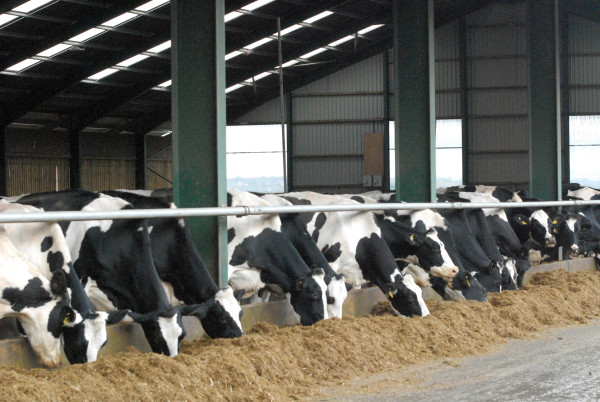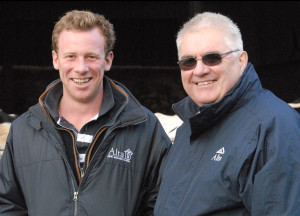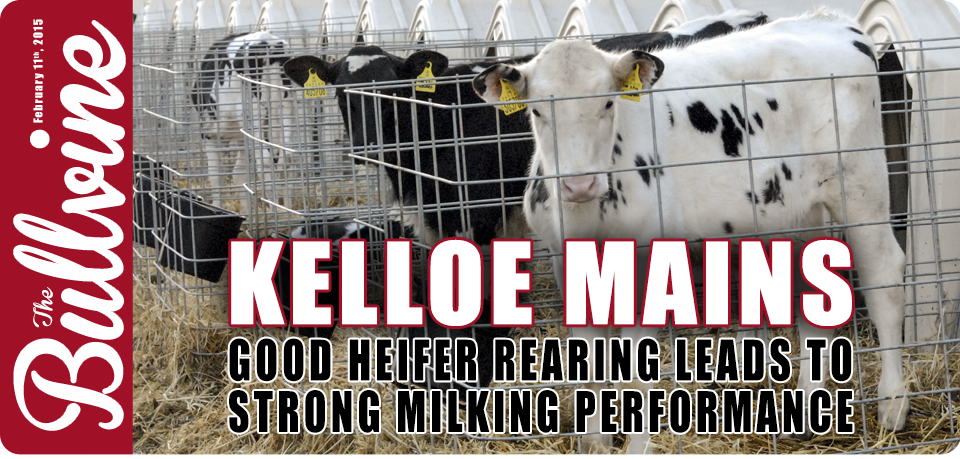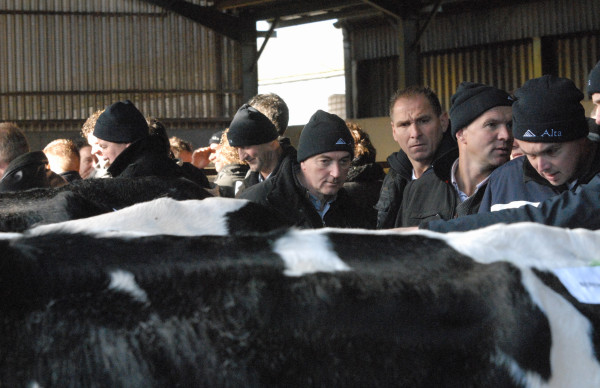The McDonald family recently invested in a new housing facility for an additional 330 cows at Kelloe Mains Farm, near Berwick-upon-Tweed. Bruce Jobson reports from the Scottish Borders.
The McDonald family milk 720 Holstein cows at Kelloe Mains Farm, Duns, Scotland, 10 miles west of Berwick-upon-Tweed. The farmland totals 2,500 acres (1,000ha) stretching over a distance of 10 miles and incorporates two farms.
Robert McDonald and his son, also named Robert, are the driving force behind the family farming business with 27-year old Robert, managing the day to day management of the dairy herd. His father continues his role at the forefront of the business and also manages the arable side of the enterprise.
Kelloe Mains has undergone a continued expansion programme and recently added a new 330 high-spec free-stall housing facility, which was completed in January 2014. The housing unit cost approximately £2,500 per cow ($c4300) (£825,000 in total: $c 1,450,000) and includes automatic scrapers and rubber matting as well as incorporating “green bedding.”
The building is high, with lots of light and ventilation and cow comfort has been a strong feature of the design according to Robert Jnr. “Animal health and welfare is a priority at Kelloe Mains and we continue to focus on management and cow comfort.
“We are currently milking over 700 cows and place strong emphasis on best management practise from the day a calf is born, through to milking. We have incorporated the Alta Advantage Programme into our management structure and this provides essential data and benchmarking of the business,” he said.

An new housing unit for an additional 330 cows cost approximately £2,500 per cow ($c4300) (£825,000 in total: $c 1,450,000)
Imports from Holland
The McDonalds increased their herd numbers in 2014 by purchasing 138 in-milk heifers and 140 in-calf heifers from Holland. The imported animals have now settled into their new environment and Robert is pleased with their performance.
Robert said. “The herd has been averaging around 10,500 – 10,700 litres at 3.8% fat and 3.3% protein, however, with the additional influx, the herd currently containing 65% heifers, and this year, we expect the yield average will be lower.
“It takes time for new animals to adjust but overall, we are pleased with the performance of the herd. We use the Alta Advantage programme as part of our overall herd management system in order to benchmark our performance data. The herd is running at 23% pregnancy rate with 45% of the cows currently pregnant at 75 days.
“Calving interval, which is based on the milking cows, rather than the latest influx, is around the 377 days with days open at 99 days. The herd is averaging 24 months at age of first-calving and in due course, we are aiming to reduce the figure to 23 months. The cows are milked through a 40-point Alfa-Laval rotary parlour on a three times per-day milking routine, averaging 34litres per day with a through-put of 125 cows-per-hour.”
The herd is fed a TMR ration using a Keenan mixer-wagon, with a separate ration to the in-calf heifers and dry cows. The milking herd ration contains 20kg of DM of forage; 2kg of whole crop; 6.5kgs grass silage, 0.5kg straw and a protein blend. The herd receives its first feed at 5.30am and is supplemented at around 10am.
Dry cows receive a close-up and far-off ration and bedding is kept clean and dry due to the availability of straw. The new 340 cow free-stall facility and older unit for 368 cows, link into a 1.9million gallon slurry tower and 2.8million lagoon incorporating an umbilical system.
Kelloe Mains Open Day
Alta Genetics recently hosted an open day at Kelloe Mains, and the event included presentations from several Alta staff as well as Robert McDonald Jnr. Over 200 visitors attended the event including 60 farmers from Holland and 16 from Italy.
Farmers seeking to breed the next generation of profitable, animal welfare friendly cattle were treated to a demonstration line-up of milking Holstein heifers using the Alta Advantage programme. Visitors could inspect the animals and were provided with milk recording details and yield projections.
Alta programme manager Drew Wilson used hand held technology to assess the type characteristics of an animal and the programme provides a list of suitable matings; based upon the type and production criteria for each individual herd requirement. The line-up of animals on display demonstrated the success of the Alta Advantage Programme Mr Wilson stated.
Mutual Benefits
Paul De Goojier, global marketing manager for Alta Genetics, led a group of 60 plus farmers from The Netherlands, as part of a UK tour and emphasised an open business philosophy. He explained: “Farmers are looking for ways to improve and learn from each other. The openday will bring value to UK farmers, the Dutch as well as Italian group, who have also attended the event.
“Everyone can discuss their needs on a full strategy basis and breeders are able to apply the genetic tools in order to select the right bulls. We have a focus on the progressive farmer in order to help with the direction of their business goals. Our programmes add value and help bring better results, breed better animals and increase genetic results,” he concluded.
Calf Rearing Trial
Calf rearing is an essential part of the Kelloe Mains philosophy based upon management and animal health and welfare aspects. New born calves are given four litres of colostrum within the first few hours of birth, followed by an additional two litres, two hours after the initial feed. After the first week, the calves receive 5 litres per day increasing to 6 litres per day after the 10th day.
Robert Jnr commented that milking cow performance starts with good heifer rearing practise. He said: “Calves can be easily overlooked but good milking herd performance and animal health and welfare issues start with quality calf management.
“We aim to wean calves at 60 days and by that time, they are receiving adlib feeding, taking onboard approximately 3kgs of 18% protein pellet and straw. Pellet feed and fresh water is introduced early in order to increase growth rates. We aim for heifers to calve-down at 24 months of age and we manage their inputs accordingly in order to achieve the required weight and growth-rates, prior to insemination.”
The farm operates a strict system with one person feeding the calves 12 out of every 14 days in order to maintain consistency of feeding, hygiene, observation and overall management. The calves are fed on waste milk, which is pasteurised on-farm after each milking, and calves are fed at 8 hourly intervals.
Kelloe Mains has traditionally reared calves in crates and the McDonald family recently purchased calf hutches as an alternative method. Calves are currently undergoing a trial to see if there are any benefits by switching to 100% rearing in calf hutches. Both sets of heifers are being weighed at 60 days, and the early results indicate a 10 – 11kg increase in weight using a calf-hutch.

Robert McDonald (left) and Alta Genetics’ Regional Manager Billy Campbell
Kelloe Mains is now using 100% genomic sires across the board according to Alta Genetics Regional Manager Billy Campbell, who has worked closely with the McDonalds for the past 25 years. “Kelloe Mains operates on a commercial-basis and animals are mated to provide profitable, long-lasting, healthy and animal welfare friendly cattle.
“The first group of genomic heifers demonstrated the reliability of the programme and the latest group of 18 heifers by 10 young genomic bulls is averaging 34 litres per day and are currently 118 days in-milk. The group is predicted to yield over 11,500kgs with two heifers projected to produce over 14,000kgs.”
All the cows are bred to Holstein bulls and in the past; sexed-semen has been used to help increase replacement heifer numbers. According to Mr Campbell, the Kelloe Mains herd demonstrates the benefits of using a large number of genomic young sires across the herd and by using a professional evaluator, has achieved positive results on type, production, herd health and animal welfare.
This article first appear in the December 2014-February 2015 Edition of Crazy Cow in Print. Click here to check out there Facebook group and watch for their new website soon.














Leave a Reply
You must be logged in to post a comment.